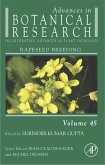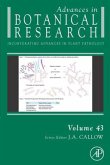Kombrink and Somssich address how plant pathogens communicate at the genetic and biochemical level in determining resistance or susceptibility. This general theme is continued in articles on the nature of fungal wilt diseases (Beckman and Roberts); plant virus infection (de Zoeten); and the gene-for-gene interactions between plants and fungi (de Wit). Ehrlich takes up the timely issue of how pressure to expand and intensify agriculture is influencing agroecosystems and natural ecosystems on a global scale. The current status and future prospects of chestnuts, in health and disease, is considered by Anagnostakis. In an article on phytoplasmas, Kirkpatrick and Smart review the recent application of molecular techniques to the inference of taxonomic and phylogenetic relationships among mycoplasma-like organisms. To conclude the volume, Savary and colleagues show how a form of systems analysis can be used to handle large and complex data sets in epidemology.
Dieser Download kann aus rechtlichen Gründen nur mit Rechnungsadresse in A, B, BG, CY, CZ, D, DK, EW, E, FIN, F, GR, HR, H, IRL, I, LT, L, LR, M, NL, PL, P, R, S, SLO, SK ausgeliefert werden.









